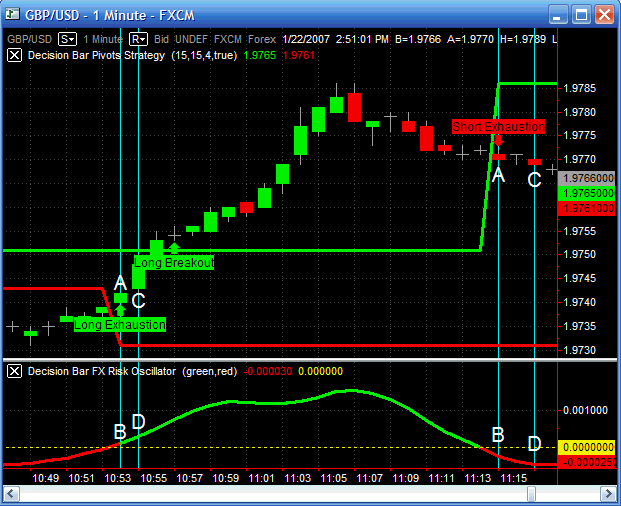FX - the FOREX market or currency market is the market where one currency is traded for another. It is one of the largest markets in the world.
Some of the participants in the FX are simply seeking to exchange a foreign currency for their own, like multinational corporations which have to pay wages and other expenses in different nations than they sell products in. Anyhow, a large part of the market is made up of currency traders, who speculate on movements in exchange rates, similar to others who speculate on the movements of stock prices.
Currency traders try to take advantage of even small fluctuations in exchange rates.
 |
| (typical trading software) |
Currency traders try to take advantage of even small fluctuations in exchange rates.
In the FX market there is little to no 'inside information'. Exchange rate fluctuations are usually caused by actual monetary flows as well as anticipations on global macroeconomic conditions. Significant news is released publicly so, at least in theory, everyone in the world receives the same news at the same time.
Currencies are traded against one another. Each pair of currencies thus constitutes an individual product and is traditionally noted XXX/YYY. For instance, EUR/USD is the price of the euro expressed in US dollars, as in 1 euro = 1.2045 dollar.
Unlike stocks and futures exchange, foreign exchange is indeed an interbank, over-the-counter (OTC) market which means there is no single universal exchange for specific currency pair.
The foreign exchange market operates 24 hours per day throughout the week between individuals with forex brokers, brokers with banks, and banks with banks. If the European session is ended the Asian session or US session will start, so all world currencies can be continually in trade. Traders can react to news when it breaks, rather than waiting for the market to open, as is the case with most other markets.
The foreign exchange market operates 24 hours per day throughout the week between individuals with forex brokers, brokers with banks, and banks with banks. If the European session is ended the Asian session or US session will start, so all world currencies can be continually in trade. Traders can react to news when it breaks, rather than waiting for the market to open, as is the case with most other markets.
Average daily international foreign exchange trading volume was $1.89 trillion in April 2008 according to the BIS study.
Like any market there is a bid/offer spread (difference between buying price and selling price). On major currency crosses, the difference between the price at which a market maker will sell ("ask", or "offer") to a wholesale customer and the price at which the same market-maker will buy ("bid") from the same wholesale customer is minimal, usually only 1 or 2 pips. In the EUR/USD price of 1.4248 a pip would be the '8' at the end. So the bid/ask quote of EUR/USD might be 1.4248/1.4249.
This, of course, does not apply to retail customers. Most individual currency speculators will trade using a broker which will typically have a spread marked up to say 3-20 pips (so in our example 1.4247/1.4239 or 1.424/1.435). The broker will give their clients often huge amounts of margin, thereby facilitating clients spending more money on the bid/ask spread.
The brokers are not regulated by the U.S. Securities and Exchange Commission (since they do not sell securities), so they are not bound by the same margin limits as stock brokerages. They do not typically charge margin interest, however since currency trades must be settled in 2 days, they will "resettle" open positions (again collecting the bid/ask spread).
 |
| (1 minute chart displaying the fluctuation between GBP and USD) |
The brokers are not regulated by the U.S. Securities and Exchange Commission (since they do not sell securities), so they are not bound by the same margin limits as stock brokerages. They do not typically charge margin interest, however since currency trades must be settled in 2 days, they will "resettle" open positions (again collecting the bid/ask spread).
Individual currency speculators can work during the day and trade in the evenings, taking advantage of the market's 24 hours trading day.
brokers and numbers @_@;
ReplyDeleteThanks for the info, broseph
ReplyDeleteA lot of good stuff here. Maybe I will start trying to invest in this manner!! I am pretty much a newbie to all this but this will definitely help!
ReplyDeletevery informative
ReplyDeleteever heard of etrade.com ? is it a good place to use if I want to start trading stocks !?
ReplyDeletei used etrade many years ago when i was still unexperienced.. i'm not sure how their website and trading tools have developed by now. it all depends on what exactly you want to do: trade stocks only? intraday trading or rather long-term trades? how much risk/profit do you want to go? there are so many online brokers nowadays, it is sometimes just a matter of taste. i will post on that topic when i have done a little more up to date research. until then i'd suggest to try their demo accounts to see if you like their trading tools and software.
ReplyDeleteI should convert my money to Euros as the dollar falls... :(
ReplyDeletethanks for the well written info, I actually learned somethin here
ReplyDeletewow lots of good info.
ReplyDeleteReally looking into this!! keep the updates coming mate
ReplyDelete